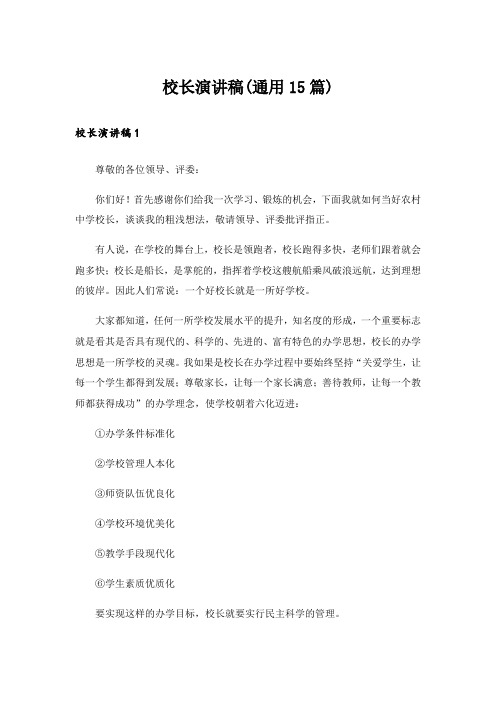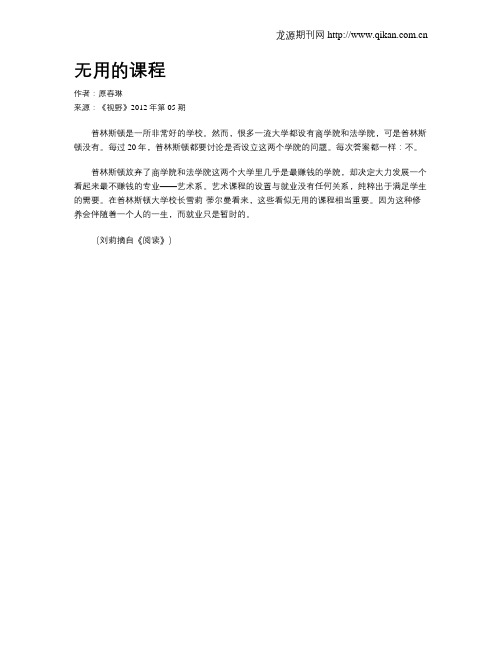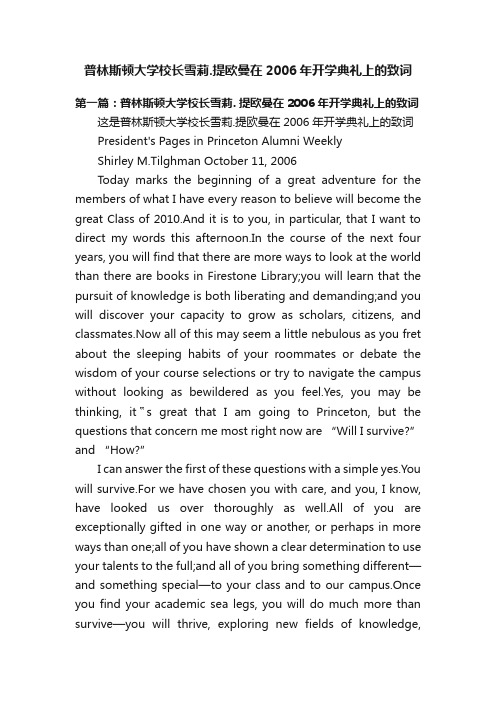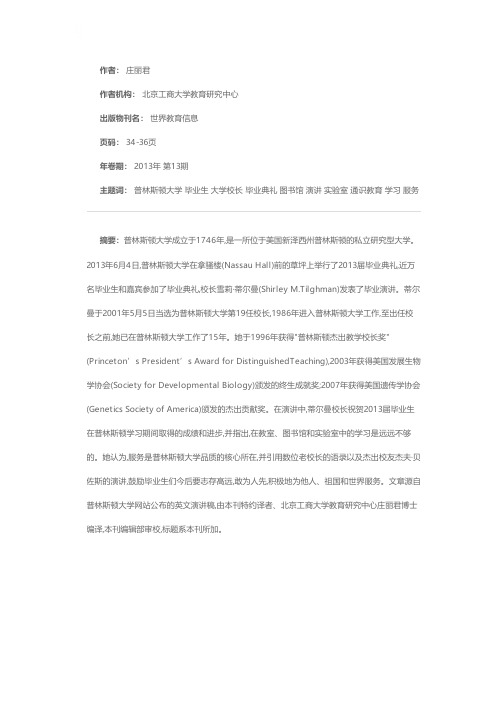普林斯顿大学校长 雪莉·蒂尔曼演讲
普林斯顿大学校长2018毕业演讲(音频中英文对照)

普林斯顿大学校长2018毕业演讲(音频中英文对照)In a few minutes, all of you will march through FitzRandolph Gate as newly minted graduates of this University. Before you do, it is my privilege to say a few words about the path that lies ahead.It is indeed a privilege, and also a joy, to address you, for all of you who graduate today have accomplished something genuinely important and worth celebrating. You have completed a demanding course of study. It will transform your life in many ways. It will expand the range of vocations you can pursue, increase your knowledge of the world, deepen your capacity to appreciate societies and cultures, and provide a foundation for lifelong learning.So we celebrate here on the lawn in front of Nassau Hall, as do other college communities in courtyards, auditoria, arenas, and stadia around the country. Graduates toss caps in the air and professors applaud. Families cheer and holler enthusiastically. Yet, even as we do so, we see a strange trend from columnists, bloggers, think tanks, and politicians. In essays, books, andspeeches, some of them suggest that too many students are earning college degrees.Too many college graduates: that is a very odd claim, because the economic evidence for the value of a college degree is overwhelming. For example, in 2014, economists Jaison Abel and Richard Deitz of the Federal Reserve Bank of New Yorkestimated the average annual return on investment from a college degree, net of tuition paid and lost earnings, at between 9 percent and 16 percent per year for a lifetime (1). For the last two decades, the return on investment has hovered at the high end of that range, around 15 percent per year.By comparison, the historical average return on investments in the American stock market is around 7 percent per year. That is why my friend Morton Shapiro, the president of Northwestern University and a leading educational economist, says that for most people, the decision to invest in a college degree will be “the single best financial decision they make in a lifetime,” even if judged purely in terms of financial return on investment.A degree conveys many other benefits as well. For example, college graduates report higher levels of happiness and job satisfaction, even after controlling for income. College graduates are healthier than non-graduates. They are more likely to exercise, more likely to vote, and have higher levels of civic engagement. To these pragmatic considerations we should add the joys that come with an increased capacity to appreciate culture, the arts, the world’s diversity, and the inherent beauty of extraordinary ideas.The numbers I have quoted are not specific to Princeton. On the contrary, they are averages over all four-year degrees, in allfields, from all colleges in the United States. Think about that for a moment: on average, all degrees in all fields from all colleges generate an annual return between 9 percent and 16 percent, and this return is supplemented by additional benefits to health, happiness, and quality of life. How could anyone think we need fewer college graduates?Some people answer that you can learn a trade without getting a college degree. Welders, they observe, can make more money than many college graduates. That’s true. There are, of course, reasons why you might want to get a college degree even if you plan to become a welder. You might worry, for example, about what happens if technology renders your trade obsolete, or arthritis leaves you unable to practice it, or you want to move into management or explore other interests. A college degree equips you to respond to the changes — to yourself, and to the world — that inevitably occur over a lifetime.Still, if pundits and politicians were saying only that America needs better vocational training, I could agree wholeheartedly. It would be terrific if more people could get the training they need to practice a trade. But at the same time it would also be great if more people, not fewer, could receive the extraordinary benefits that come with a college degree.So I ask again: why would anyone think we need fewer college graduates? I think there is a simple answer. Education requires high-quality teaching. Teaching, in turn, depends upon skilled labor, which is expensive. As a result, the up-front cost for education is real, large, and easy to measure. The returns are equally real and even larger, but they accrue over a lifetime, are hard to measure, and vary from person to person. It is tempting to wish that you could get more certainty at lower cost.The people who call for fewer degrees yield to that temptation. They emphasize the short-term. They focus almost entirely on the price of college and on the salaries students might earn in their first jobs. That is a mistake.A college education is a long-term investment. It enables graduates to develop and adapt, and it pays off spectacularly in the long run. The idea that we would be better off with fewer college graduates is a short-term swindle, a swindle that will cheat America’s young people, weaken the nation''s economy, and undermine our future. We need to have the confidence to invest in our young people and to ensure that a college education is accessible and affordable for students from all backgrounds and financial circumstances.I hope that all of you who graduate today, and who experience the power of education in your own lives, will become advocates for the value of higher education in our society. There is a national conversation taking place right now about the value of higher education, and we need your voice in that conversation. We need you, in other words, to help others to achieve in the future what you achieve today.How can you help more students earn college degrees? Here are three suggestions. First, become advocates for the importance of completion rates. A college education produces a tremendous return—if you get the degree. Returns are much lower if you start college but do not get the degree. The highest default rates on student loans do not involve college graduates with big debts. They instead involve students with small debts who never finish college and so never get the earnings boost that comes with a degree.A few moments ago, we awarded an honorary degree toPresident Barbara Gitenstein. Over her nearly two decades leading The College of New Jersey, she raised the College’s four-year graduation rate from 58 percent to 75 percent, a number that puts TCNJ’s on-time completion rate among the top ten in the nation for public colleges and universities. By raising TCNJ’s graduation rate, President Gitenstein has improved the lives of thousands of students who might have left school with debt but no degree. Be an advocate for higher education leaders like Bobby Gitenstein, and for colleges like TCNJ that commit to improving completion rates.Second, support America’s public institutions of higher education. State subsidies for public colleges and universities have declined precipitously, and state funding represents an increasingly small share of the budget at public research universities. At the University of Michigan, for example, state funding now accounts for only about 9 percent of total revenues. In the 1950s, by contrast, that number was 80 percent. Tuition at state universities has risen not because they have increased their expenditures per student, but because state legislatures have hollowed out their other sources of support.America depends on its public colleges and universities. They are engines of social mobility and innovation. Princeton and other private universities make essential contributions to the nation and the world — but there is no way that we could ever replace America’s great public institutions. They are a national treasure, and I urge you to support them.Third, stand up for the importance of enabling more students from low-income families to earn college degrees. Princeton’s Great Class of 2018 graduates today as the most socioeconomically diverse class in the 272-year history of thisUniversity. You will not hold that record for long. Other classes already at Princeton will break your record. Our graduate programs are likewise drawing upon new sources of talent: this spring we admitted the most socioeconomically diverse class of doctoral students in Princeto n University’s history.At Princeton we believe in socioeconomic diversity because we know that to achieve excellence as a University and as a nation we must draw talent from every sector of society. We know, too, that a Princeton degree is a rocket-booster for students seeking socioeconomic mobility. If we want to heal the divisions that inequality has produced in this country, we must ensure that students from low-income backgrounds receive the educations they need to develop their abilities and contribute to our society.As I look out at our extraordinary class of undergraduate, masters, and doctoral degree recipients, I take pride in your excellence and your diversity, and I am excited about the contributions you will make in the years ahead. The world needs more college degrees, not fewer. We need more celebrations like the one we hold today, with more proud families and happy graduates ready to go out and make a positive difference in the world. All of us on this platform are thrilled to be a part of your celebration. We applaud your achievements. We send our best wishes as you begin the adventures that lie ahead, and we look forward to welcoming you back to this campus on future visits. To the Great Class of 2018 and all of our graduates, congratulations!2018毕业典礼致辞Christopher L. Eisgruber总统2018年6月5日再过几分钟,你们所有人都会在菲茨兰多夫门前游行,成为这所大学新毕业的毕业生。
读完这篇文章 再决定做不做博后

读完这篇文章再决定做不做博后如今科研圈的博士后越来越多,职位却越来越少,博士后出路何在?当索菲·蒂奥-雷斯蒂图托(Sophie Thuault-Restituito)的博士后生涯到达第12年时,她终于受够了。
她在伦敦完成了第一期博士后研究工作,接着在2004年来到纽约大学开始了第二期。
历经8年,换了两个实验室后,她还在那儿当博士后,仅靠外界资金来确保她的博士后资格并为她提供薪水。
她对阿尔兹海默病的研究没能发表在高水平期刊上,这意味着她无法竞争美国或欧洲的学术职位。
她热爱科学,也有着丰富的经验,但因家中有两个年幼的孩子,她需要更稳定的工作。
“我的动机已经消失,我再也不想碰科研了,”她说。
因此,在2013年,蒂奥-雷斯蒂图托在纽约大学找到了一份实验室管理经理的工作,主要负责协调建筑的维护,以及促进不同实验室之间的交流合作。
她十分喜欢现在的工作,有确定的工作时间,同时也有更好的薪酬与福利。
但在作出这一转变的同时,她也为结束研究生涯感到忧伤,并后悔自己浪费了多年时光追寻科研目标,最终又放弃。
“我早该在五年前就结束博士后的,”她说道。
蒂奥-雷斯蒂图托的经历,正是如今畸形的博士后系统的一个缩影。
这些高度熟练的科学家是推进科学研究的主要动力,但他们往往却得不到很好的回报,也没有办法在学术界更进一步。
近年来,科学界博士后的人数激增:仅仅在美国,2000年和2012年之间博士后的人数就增长了150%。
然而,终身教授和其他全职工作岗位的数量却趋于稳定,在一些地方甚至是减少的。
许多博士后选择到其他领域工作,但选择留在科研领域奋斗的博士后却被困住了。
他们最终变成“永久博后”:做了一期又一期的博士后,在博后位置上一待就是好多年,其中有少部分人再也没有离开博士后岗位。
2013年美国有40 000多名博士后,其中将近4 000人已经做了至少6年博士后了。
这一问题在美国庞大的生物医药科研领域最为突出,但同样的趋势在其他国家和专业领域也蔓延开来。
世界一流大学的教育理念

世界一流大学的教育理念别敦荣 张 征在一定意义上,大学发展史是一部大学教育理念的演进史。
从世界一流大学的形成过程看,先进的教育理念是其重要的思想基础。
就世界一流大学教育理念而言,它往往体现了高等教育的人才培养规律,是教育活动的最高指导原则,也是其之所以能够培养出众多杰出人才,为人类文化发展、科学技术进步、社会文明繁荣做出重大贡献的精神支柱。
我国正在努力建设高等教育强国,一批大学确立了建设世界一流大学的发展目标。
毫无疑问,不论是西方古典大学还是后发的现代大学,其成功经验都值得我们汲取,尤其是其先进的教育理念,包括其教育理念在适应时代发展需要过程中所进行的不断调整、演变和创新。
一、“让每一个学生拥有才智以及具备成为良好公民和英明领导者的必备性格”世界一流大学以培育杰出人才为使命,培育英才是贯穿其教育历史过程的主线。
托斯顿.胡森认为,无论从社会地位上看还是从知识水平上看,大学都是一个教育英才的机构,但随着社会不断发展,大学的人才培养职能与范围逐渐拓宽,大学承担着为现代社会培养多层次多类别高级专业人才的使命。
世界一流大学固然无法置身专业化教育的浪潮之外,但英才教育的传统却在这些大学得到了很好地传承与弘扬,尤其在高等教育大众化时期,世界一流大学更是将其核心价值定位于为社会培养精英人才。
在19世纪专业化教育的浪潮兴起之前,世界各国大学都是培养社会精英的场所。
欧洲中世纪大学主要通过文法、逻辑、修辞等课程训练学生的心智,使他们能够以理性的方式行使教会的、政府的和社会的权力。
历史学家在对中世纪大学进行考察后发现,在15世纪,学位被当做一种学术证明,在某种程度上,是竞争教会和世俗职位的重要砝码。
在增补重要的牧师和官员时,也会考虑学位的级别。
这样,从没有学位到产生学位,大学教育成为从事拯救灵魂、法律实践、政府管理、医疗和教育等各类职业的精英们的显著标志。
[1]一直到近代,大学都以培养柏拉图理想国中的“自由人”为其目的,正如纽曼所言,大学是传授普遍知识的场所,是培养“社会公民”的场所,大学教授的艺术是一种社会生活的艺术,大学教育的目的就是为了让学生适应世界。
校长演讲稿(通用15篇)

校长演讲稿(通用15篇)校长演讲稿1尊敬的各位领导、评委:你们好!首先感谢你们给我一次学习、锻炼的机会,下面我就如何当好农村中学校长,谈谈我的粗浅想法,敬请领导、评委批评指正。
有人说,在学校的舞台上,校长是领跑者,校长跑得多快,老师们跟着就会跑多快;校长是船长,是掌舵的,指挥着学校这艘航船乘风破浪远航,达到理想的彼岸。
因此人们常说:一个好校长就是一所好学校。
大家都知道,任何一所学校发展水平的提升,知名度的形成,一个重要标志就是看其是否具有现代的、科学的、先进的、富有特色的办学思想,校长的办学思想是一所学校的灵魂。
我如果是校长在办学过程中要始终坚持“关爱学生,让每一个学生都得到发展;尊敬家长,让每一个家长满意;善待教师,让每一个教师都获得成功”的办学理念,使学校朝着六化迈进:①办学条件标准化②学校管理人本化③师资队伍优良化④学校环境优美化⑤教学手段现代化⑥学生素质优质化要实现这样的办学目标,校长就要实行民主科学的管理。
治校的关键在于管理。
管理不是约束人,而是激励人;领导不是管住人群,而是凝聚人心,学校管理的核心是对人的管理,管理的最高境界是被管理者的自我管理,我要把建章立制的“硬”管理和具有人文特色的“软”管理做到最佳的结合。
校长是决策者。
校长是学校的领导核心,但校长的核心地位及其权威不能单纯凭法定权力去建立,而应注重培养自己的非权力影响力——即高尚的人格魅力,要以自己的思想,学识和言行赢得教师的认同、敬佩,进而凝聚成校长的威信。
这就要求校长要以高尚的品格感染人,以广博的知识吸引人,以创新的能力征服人,以民主的氛围熏陶人,带领全校教职工树师风、铸师魂、强师能,为培养未来的建设者而努力工作。
校长的魅力影响着领导班子的活力,校长对方向的把握,决策的指引,品德的影响、精神的感召,成为领导班子凝聚力的催化剂和战斗力的粘合剂。
所谓“君闲臣忙国必兴,君忙臣闲国必衰”,从正反两方面说明了在一个领导集体中,主要领导人应该怎么做,校长手里不应拿着鞭子,而应高举着旗帜,领导班子的活力是学校工作取得成绩的关键,无数事实证明,一个校风正、学风浓、管理好、质量高的学校就一定有一个团结、勤勉、实干、高效而又具有活力的领导集体,反之只能导致内耗。
【讲义文稿】科研无止境奋斗正青春

【讲义文稿】科研无止境奋斗正青春生命本身是自然创造的一个奇迹,有史以来,人类探索生命奥秘的步伐从来没有停歇过,众多科学家也为此付出了智慧和辛劳。
2023年11月22日,中国两院院士增选结果正式揭晓,探索生命奥秘的结构生物学家颜宁位列其中,她是本年度新增两院院士中年龄最小的3个人之一。
当记者问她对当选有何想法时,她淡定地说:“帽子不会改变你这个人,不改变你是谁,最重要的是作为一个科研工作者,我们追求的是在科学史上留下了什么,为社会做了什么。
"那么,我们就依据颜宁自己说的话,去探探颜宁的成才之路,去看看颜宁的科研成果。
颜宁有一种与生俱来的人生自信,借用唐代诗人李白的名句来形容,就是“天生我才必有用“,“直挂云帆济沧海”。
1977年11月,颜宁出生于齐鲁腹地的山东章丘。
幼儿时,她和泥土为伴,上树掏鸟,下河捉鱼,活脱脱一个假小子。
6岁时,她随父母到北京大兴上小学。
颜宁上小学时从没有在家做过作业,所有作业在学校就完成了。
她也没有上过补习班、特长班,但她聪慧过人,凡参加的竞赛,都能得奖。
不过,得了奖父母也从不奖励。
这种崇尚自然、尊重个性的淡定,给孩子成长创设了自然宽松的环境。
我们常说:“有心栽花花不开,无心插柳柳成荫。
”许多时侯,家长心越切,孩子越难成才。
一个家庭的压力越大,反压力越强,而颜宁的家庭,始终是从容淡定的。
颜宁在大兴一中(当时是黄村一中)整整度过六年(1990-1996)的中学时光。
在高中班主任眼中,颜宁是一个笑容总挂在脸上,听课认真,勤奋上进,学有余力,爱好读书,多才多艺的好学生。
尽管选了理科,文科成绩也是全校第一名。
当年的老师如今提起颜宁,依然赞不绝口。
生物老师潘娜说:“平时衣着朴素大方,生活简朴;另一方面,也就是内在的朴素,是指她思想上的纯粹,对待学习一丝不苟,上课极其专注,从不走神,思维敏捷,乐于钻研并且享受与老师同学相互切磋交流J物理老师刘岩也有同样感触:”颜宁的学习效率极高,我想这是源于她上课专注。
八年级语文上册第一单元任务二《新闻采访》课件(1)

现场访谈 流程
前期准备 现场问答 后期整理
1、确定采访主题。通过研究分析,找准热点、关键点,确定 采访主题。主题应有价值、有深度、有新意。 2、选择、联系采访对象。确定主题后,从专业背景、个人经 历、身份性情等方面慎选择采访对象。确定后,与之联络, 说明采访主题、目标等,发出邀请。约定采访时间、地点等。 3、收集相关资料,拟出采访提纲。环绕采访主题和对象,收 集与之相关资料,分析、研究。拟出采访提纲,保证采访效 果。(采访提纲见书P13)
雪莉·蒂尔曼:……
水均益:到底什么是干细胞?雪莉·蒂尔曼: …… 水均益:就我的理解,它们就相当于人体中或者是其他动物体中最基本 的组成部分,可以这么说吗? 雪莉·蒂尔曼:…… 水均益:那么研究这些干细胞有什么医学用途呢,或者说是研究这些干
细胞的医如学果用采途访在对什象么是地方专呢业?人士,如果采访的话题涉及其 雪莉所·蒂研尔究曼的:…专… 业领域的概念,这时采访者就需要从普通 水均受益众:如的果视—角—进我行再次发用问这,并个将词深——奥如的果知我识们“在翻干译细胞”方成面通的研究取
采访问题要环绕采访目的来拟,要具体、客观、有 针对性,问题之间要有逻辑联系。
水均益:秘书长先生,我知道您最近一直很忙,不光要来中国访问,还 得面对您一个月前接受BBC采访后产生的一系列问题。我个人在看那个
采访的时候一直有个疑问,您事先是否对那样的问题以及事后各方的反 应有所准备?安南: ……水均益:所以您的意思是说,您对此事的立场一直 是统一的。安南:……水均益:就在这个采访播出后,您受到了来自多方 的压力,其中也包括鲍威尔先生给您打来的一通电话,您感到压力大吗?
分组讨论: 记者们冒着生命危险进入疫区进行采访,
水均益专访普林斯顿大学校长

节目预告:干细胞研究,攻克绝症的希望,美国前总统里根的家人奔走呼吁,轮椅之上的超人也为此不断疾呼。
他们从中看到了生的希望。
里夫:“干细胞就是医药界的未来。
”她,全球顶尖的分子生物学家,告诉世界:“干细胞研究前景远大,尤其是针对那些我们现在还医治不了的疾病。
”但这项研究却在美国总统选举中引发了争议,布什克里各执一端,争辩不休。
科学研究的道德界限到底在哪里?雪莉·蒂尔曼普林斯顿大学的第一位女校长,人类基因图谱破译的功臣,做客高端访问,接受水均益专访,讲述科学与道德的冲突,解释干细胞研究的广阔前景。
他(里根)曾经是两届美国总统。
曾经在冷战的最后岁月中叱咤风云。
(里根同期声:戈尔巴乔夫先生打开了一扇门,戈尔巴乔夫先生推倒了一堵墙。
)他曾经用自己的智慧和幽默打动美国人。
(里根竞选同期声:我不会在这次大选中拿年龄问题做文章,我不会为了政治目的攻击对手年轻和经验不足。
)然而到了晚年,他却蹒跚在老年痴呆症的病痛中,他的亲人期望他重新获得健康,始终在寻觅新的治疗方法,一项科学研究让他们看到了那线希望。
他(超人里夫)曾经拥有强健的体魄。
也拥有冒险家的精神。
(电影镜头——超人接住空中落下的小姐:别紧张,小姐,我接到你了。
小姐惊恐万分:你接到我了?拿谁接到你了呢?)他演绎了超人,然而一次意外却让他从星光灿烂的大道上瘫痪在轮椅上,他曾经沮丧,曾经想到过自杀,但是,他依然对生命的奇迹怀有希望,多年来,他一直在为推进一项科学研究发出呼吁,相信科学能够创造生命的奇迹。
(里夫同期:干细胞研究已经能治愈瘫痪的动物,干细胞就是医药界的未来。
请大家都挺身而出支持这项研究。
)是的,干细胞研究,让许许多多的人,看到了未来的希望,这项研究得成功将大大提高人的健康质量。
也许正因为如此,作为科学议题,第一次闯入了美国的总统大选,成为总统候选人辩论的重要问题。
布什和克里对干细胞研究分歧明显,辩论观点泾渭分明,有评论说,关于干细胞研究的政策已经成了影响选情走向的重要因素之一。
走上科研的道路

走上科研的道路, 一般比较多的是两条路,一个是学术界,一个是工业界,也就是在大药厂或生物高科技公司做药物的研究开发。
大家对在学校在研究所做研究有相当的了解,但对在医药工业界如何做研究,怎么做,却不太清楚。
我自己也是长期以来一直在学术界工作,但现在在药厂从事药物的研究开发,有很多体会。
我想和大家分享一下,在学术界与企业界做科研,到底有多少差别和类似的地方。
学术界和工业界,对学生对科学家有什么不同的要求。
不管你今后要做什么,有一个基本点,就是怎样选择最适合你的事业。
中国的社会发展越来越快。
即使你今天你觉得以后要做什么,但过10年、20年后再看看,到底有多少人会坚持最初的选择?社会在进步,对人的要求在改变,人的兴趣也会改变。
现在比较好的是我们可以选择,不像过去是分配工作的。
现在面临的问题是我们怎么样做出选择。
Slide #2 为此我先向大家推荐一本书《From Good To Great,从优秀到卓越》。
这本书对华尔街上市的2000多家公司进行分析,找出了仅有的12家所谓” 优秀到卓越”公司。
它们的业绩比所有公司的平均值高三倍,而且不是高一年二年,而是连续高15年以上。
研究结果发现,这些公司有些共性。
其中有一个是Hedgehog concept,就是刺猬概念,认为无论是公司还是一个人,在选择要做什么的时候,要考虑兼顾三个基本要素。
所谓注意集中在三个圆圈的交界处:首先你要做你自己非常感兴趣的事。
如果你对一件事情本身不感兴趣,纯粹是为了赚钱,为了谋生,那你不可能做的很好。
所以你首先要考虑自己的兴趣在那里,激情在那里。
但是你感兴趣的事情不一定是你做的最好的事情。
比如:你对唱歌特别有兴趣,但你天生是个破锣嗓,你能成为歌星吗?所以,第二点你要考虑的是你的长处,你要做你擅长做的事情。
有些人擅长和动物打交道,有些人喜欢分析,有些人喜欢看书,有些人喜欢和病人打交道。
所以你必须要找到你自己特别喜欢又特别擅长的东西。
这是两个基本要素。
无用的课程

龙源期刊网
无用的课程
作者:原春琳
来源:《视野》2012年第05期
普林斯顿是一所非常好的学校。
然而,很多一流大学都设有商学院和法学院,可是普林斯顿没有。
每过20年,普林斯顿都要讨论是否设立这两个学院的问题。
每次答案都一样:不。
普林斯顿放弃了商学院和法学院这两个大学里几乎是最赚钱的学院,却决定大力发展一个看起来最不赚钱的专业——艺术系。
艺术课程的设置与就业没有任何关系,纯粹出于满足学生的需要。
在普林斯顿大学校长雪莉·蒂尔曼看来,这些看似无用的课程相当重要。
因为这种修
养会伴随着一个人的一生,而就业只是暂时的。
(刘莉摘自《阅读》)。
普林斯顿大学校长雪莉.提欧曼在2006年开学典礼上的致词

普林斯顿大学校长雪莉.提欧曼在2006年开学典礼上的致词第一篇:普林斯顿大学校长雪莉. 提欧曼在2006年开学典礼上的致词这是普林斯顿大学校长雪莉.提欧曼在2006年开学典礼上的致词President's Pages in Princeton Alumni WeeklyShirley M.Tilghman October 11, 2006Today marks the beginning of a great adventure for the members of what I have every reason to believe will become the great Class of 2010.And it is to you, in particular, that I want to direct my words this afternoon.In the course of the next four years, you will find that there are more ways to look at the world than there are books in Firestone Library;you will learn that the pursuit of knowledge is both liberating and demanding;and you will discover your capacity to grow as scholars, citizens, and classmates.Now all of this may seem a little nebulous as you fret about the sleeping habits of your roommates or debate the wisdom of your course selections or try to navigate the campus without looking as bewildered as you feel.Yes, you may be thinking, it‟s great that I am going to Princeton, but the questions that concern me most right now are “Will I survive?” and “How?”I can answer the first of these questions with a simple yes.You will survive.For we have chosen you with care, and you, I know, have looked us over thoroughly as well.All of you are exceptionally gifted in one way or another, or perhaps in more ways than one;all of you have shown a clear determination to use your talents to the full;and all of you bring something different—and something special—to your class and to our campus.Once you find your academic sea legs, you will do much more than survive—you will thrive, exploring new fields of knowledge,delighting us all with your artistic and athletic prowess, challenging us with your original world view, forming lifelong friendships, and finding ways to be of service to others.In time, the butterflies you feel today will be just a distant memory, and your confidence in your abilities will match the faith that we have placed in each and every one of you.How to make the most of your time at Princeton requires a longer answer, but I think it can be boiled down to five essential ingredients—the keys to a truly successful undergraduate experience.First and foremost, find and then follow your passions.This is not the time in your life to play it safe or to rest on your laurels.This is a time to be adventurous and to be honest with yourself about what really gives meaning to your life.Perhaps you are a closet poet but have never had the confidence to share your verse with others.If that is the case, sign up for a course in our Program in Creative Writing where outstanding poets and teachers like Paul Muldoon and C.K.Williams are ready to work with you.Perhaps you have been inspired to understand and find cures for intractable diseases.Then chart a course for the Lewis Thomas Laboratory, where Professor of Molecular Biology Yigong Shi is unraveling the molecular mechanisms by which cancer cells make the decision to grow or die, or for the Lewis-Sigler Institute, where Professor Manuel Llinás is exploring the life cycle of the Plasmodium parasite, the cause of malaria, which claims some 1.5 million lives a year.Or perhaps you want to understand and contribute to the fragile ties that hold our global community together.If this is your passion, then I recommend you visit the Woodrow Wilson School of Public and International Affairs, where Professor Gary Bass is exploring the efficacy of humanitarian interventions and Professor Jennifer Widner isexamining how failed states can be effectively rebuilt.And if you are a budding engineer, who wants to use technology to change the world, I suggest you gravitate toward Professors of Computer Science Larry Peterson and Jennifer Rexford, who are inventing the next version of the Internet.Or perhaps you are one of the many students who arrive on your first day at Princeton without having committed yourself to any one subject or pursuit.You are not only in luck but you are in the majority, because past history tells us that 70 percent of you are going to concentrate in a discipline other than the one you declared on your application to Princeton.For you, our course offerings contain a vast array of possibilities from which to begin your search for what fascinates you.Indeed, what makes this University and this point in your lives so wonderful is that there are very few subjects you cannot pursue.The greatest difficulty you will face, I predict, is narrowing your choices to four or five each semester.Being true to your passions now may take you in directions that have little to do with the career you will ultimately follow, but I want to assure you that this is not a problem.Princeton is not a trade school where young men and women are groomed for specific occupations.Rather, the purpose of a liberal arts education, to paraphrase Woodrow Wilson, our 13th president, almost 100 years ago, is to acquire the power to distinguish good reasoning from bad, to digest and interpret evidence, and to develop a taste for knowledge and a deep respect for the integrity of the human mind.This is the reason we place so much emphasis on a multidisciplinary education—one that encourages scientists to study the novels of Toni Morrison and the symphonies of Ludwig van Beethoven, and humanists to study Charles Darwin‟s theory of natural selection and Albert Einstein‟s theory of relativity.Aliberal arts education is not, as a literal translation might suppose, a leftwing curriculum for artists.On the contrary, it encompasses a breadth of academic study that is, according to the Latin derivation, “proper to free persons.” In medieval times, education was limited to a small elite, but today the liberal arts are pursued by all who wish to exercise their minds, freely and openly, in order to acquire the intellectual grounding they need to excel in life, regardless of their profession.This brings me to your parents, who are understandably anxious to turn the generous investment they are making in your education to good account.Thanks to the cell phone and e-mail, not to mention text messaging, you have instant access to your parents, and they have instant access to you.I can hear them now: “A course on …Women and Film‟? How is that going to pay the bills? Will that get you a job?”Such questions, although perfectly understandable, should not be allowed to drive your intellectual agenda here.Always remember that a Princeton education, no matter how impractical it may, at times, appear on paper, is more than the sum of its parts and will always open doors in the world beyond the FitzRandolph Gates.Now is the time to do what you are compelled by your intellectual curiosity to do.The future, with Princeton degree firmly in hand, will take care of itself, and your life will be richer for it.(My second piece of advice is to be bold and to explore uncharted territory.The third thing you should do is pace yourselves.A fourth key to success is to understand and embrace the sense of responsibility that comes with an education at an institution like this st but not least, I want your years at Princeton to be fun.)(这里就只截取了每一点的论点)Now you have your homework for the next four years.Pursue your passions, venture where you have never ventured before,pace yourself, serve others, and have lots of fun.If you can do all this—and I am confident you can—your lives will be forever shaped by the experiences you will have and share over these next four years.Good luck to you all—I‟ll be watching!第二篇:在2011年秋开学典礼上致词在2011年秋开学典礼上致词各位老师、同学们:大家好!在这个美丽如画的收获季节,我们又迎来了一个崭新的学年,迎来了一批朝气蓬勃的新同学和一批新老师。
试探普林斯顿大学之办学特色

试探普林斯顿大学之办学特色普林斯顿大学是一所历史悠久的大学,从古典学院发展成为如今的世界一流大学,明晰学校定位且秉承“小而精”的办学特色,是普林斯顿大学的办学之道。
雪莉·蒂尔曼见证了这所世界顶尖研究型大学的发展,并成为普林斯顿大学第一位女校长,她的教育理念体现并发展着普林斯顿大学的办学特色。
文章从分析雪莉·蒂尔曼的教育理念出发,进一步探析普林斯顿大学的办学特色,梳理其成功的发展经验,以期为我国高校“双一流”建设提供些许参考。
标签:教育理念;办学特色;世界一流大学;普林斯顿大学;雪莉·蒂尔曼普林斯顿大学是美国著名的私立研究型大学,是当今世界一流大学。
然而,普林斯顿大学并非一开始就有如今的辉煌,曾经的普林斯顿大学实力远在哈佛大学、耶鲁大学,以及约翰·霍普金斯大学等高校之后,但正是每一任校长的不懈努力,让普林斯顿大学在改革与坚守中,清晰了发展定位,明确了办学理念,继而享誉世界。
“常青藤三巨头”之一的普林斯顿大学,用它“小而精”的办学特色,诠释着别样的世界一流大学人才培养模式。
对于世界一流大学人们常有“高”“大”“全”的固有印象,门槛高、研究深、规模大、学科全似乎是目前不少中国大学争创一流的目标,但普林斯顿却用它的别致和精巧征服了世界,这无疑为正在大力推进“双一流”建设的中国高校提供了另一种发展角度的思考。
一、雪莉·蒂尔曼的教育理念1.兼顾科研与教学雪莉·蒂尔曼于1986年进入普林斯顿大学担任生命科学教授,2001年成为普林斯顿大学第一位女校长。
作为常青藤大学校长,雪莉·蒂尔曼无论在科研还是教学方面,都做出了卓越的贡献。
世界第一例哺乳动物基因克隆实验的成功,便源于雪莉·蒂尔曼和同事们的不懈努力,她还是人类基因图谱破译的功臣,是世界顶尖的生物学家。
除了科研,在教学上雪莉·蒂尔曼也有所建树,她先后在宾夕法尼亚大学和普林斯顿大学任教,1996年雪莉·蒂尔曼获得普林斯顿大学杰出教学“校长奖”,她发起的普林斯顿大学博士后教学伙伴行动,丰富了每年来到普林斯顿的博士后们的教学经验,同时也促进了他们的研究。
科学家颜宁励志事迹故事

科学家颜宁励志事迹故事颜宁将是杰出青年女性科学家的榜样,科学家颜宁事迹同学们了解多少呢?下面给大家分享一些关于科学家颜宁励志事迹故事2024年(精选15篇),希望能够对大家的需要带来力所能及的有效帮助。
科学家颜宁励志事迹故事(精选篇1)某年,不到30岁的颜宁回到清华大学,成为该校最年轻的教授、博导,她在医学院独立建设并领导了一个实验室,开始了她的独立研究之路。
此前7年,颜宁在普林斯顿大学一直致力于蛋白质结构研究,正因为这段经历,她决定向结构生物学中最难的领域——膜蛋白(即细胞膜上的蛋白质)“开炮”。
“人体的遗传靠的是DNA,而各种功能的实现则要靠蛋白质。
如果说DNA决定了一部机器是汽车而不是马车,那么实现这部机器功能的发动机、轮子和方向盘就是蛋白质。
”颜宁告诉记者,人得病是某种蛋白质出了问题,通过解析膜蛋白结构,就能明确知道是哪里出了问题,进而着手研究修复的办法,最终达成治病的目的。
在人类基因组的2万多个基因中,约有30%编码的是膜蛋白;而在FDA批准上市的药物中,一半以上以膜蛋白为作用目标。
很多基础生命活动,都需要膜蛋白的参与:作为“载体”帮助营养物质分子完成跨膜转运;作为“受体”,帮助传导各种细胞信号;作为“通道”,精细调控小分子与离子在细胞膜两侧的'浓度。
然而,对于数量如此庞大、功能如此重要的膜蛋白,科学家对它们的精微结构和工作机理却一直知之甚少。
科学家绝非对膜蛋白视而不见。
相反,世界范围内有许多研究膜蛋白结构的科研小组,但由于膜蛋白不容易提取、提纯等问题,这些小组要么长期艰难跋涉,要么中途改弦易辙。
当然,也有极少数团队能有斩获,颜宁领导的研究小组,就是其中的杰出代表。
回国前,颜宁计划用3至6年研究出一个膜蛋白结构,而如今,她的科研团队用了不到5年时间,就成功解析了5个重要膜蛋白的结构,并初步揭示其工作机理。
“大家在科研领域的出色表现向世界证明,在中国同样能取得一流的研究成果,有些成果甚至比海外实现得更快更好。
永不过时的人文教育

永不过时的人文教育作者:雪莉·蒂尔曼来源:《世界教育信息》2012年第11期编者按:雪莉·蒂尔曼(Shirley M·Tilghman),美国普林斯顿大学校长、世界著名分子生物学家。
蒂尔曼于2001年就任普林斯顿大学校长,是该校历史上首位女性校长。
文章系蒂尔曼在普林斯顿大学2012年毕业典礼上的演讲。
在演讲中,她对毕业生4年来在各方面取得的成绩给予肯定,对毕业生的未来发展寄予期望,同时着重强调了人文教育①的重要性。
蒂尔曼指出,人文教育可以培养出品德高尚、思想深刻、知识广博、创新力强、富于同情心和使命感的高素质人才,而这样的人才正是推动国家发展的中流砥柱。
文章系本刊特约译者、首都师范大学孙端根据普林斯顿大学网站公布的英文演讲稿翻译而成,标题系本刊所加。
我很荣幸遵循这样一个传统,即在开学典礼上首先发言,而在毕业典礼上最后发言,两个发言就像一排书本两端的书挡一样,代表着你们在普林斯顿学习生活的始末两端。
4年前,我曾在开学典礼上预言,你们在普林斯顿的学习时光将会转瞬即逝,而我在最近几周听到你们中的一些人感慨“的确如此”。
你们可能正在怀念在普林斯顿度过的时光,但是我希望你们的成就感、喜悦感以及对未来的憧憬会缓解这种感伤的情绪。
毕竟,我们今天应当展望未来——你们的未来。
否则,我们完全可以把这个典礼称为“结束典礼”(Termination Exercise),而非“新的开始”(Commencement)。
在展望未来之前,请允许我首先回顾一下你们在这所大学留下的各种印记,正如这所大学曾给你们留下的印记一样。
你们曾给校园带来动听的音乐、美丽的舞蹈、富有感染力的戏剧,这些都带给人们启迪和快乐。
在运动场上,你们为自己赢得了荣誉。
男子壁球队在总教练鲍勃·卡拉汉的带领下获得全国总冠军,女子曲棍球队第7次蝉联常春藤高校联盟冠军。
你们饲养蜜蜂,观察鸟类,破解魔方,提高奶酪销量,参与企业管理,为环境可持续发展奔走游说,你们呼吁公平与平等,就种族问题展开对话,就教育改革展开辩论,来帮助那些不幸的人们。
【最新】普林斯顿大学校长毕业典礼致辞word版本 (1页)

【最新】普林斯顿大学校长毕业典礼致辞word版本本文部分内容来自网络整理,本司不为其真实性负责,如有异议或侵权请及时联系,本司将立即删除!== 本文为word格式,下载后可方便编辑和修改! ==普林斯顿大学校长毕业典礼致辞雪莉·蒂尔曼 201X年5月5日当选为普林斯顿大学校长,而且是该大学200多年历史上首位女校长。
在当选之前,她曾在普林斯顿大学任教15年,是一位卓越的教师和世界知名的学者,还是分子生物学领域的顶尖人物。
普林斯顿大学雪莉·蒂尔曼:社会比以前更加艰难首先,我非常荣幸能够延续普林斯顿大学长期以来的传统,成为既是开学典礼上讲话的第一人,也是结束毕业致辞的最后一人。
在这段时间里,你们对社团服务作出的贡献让我惊叹,我骄傲地看着你们在面对历史性自然灾害的反应,不论是在海地太子港的街道还是中国四川大地震时的山地上,我都能看到你们的身影。
任何试图改变这个世界的人最终都会发现这个道理:说起来容易做起来难。
我在早年时遇到过一位病理学教授,他的课桌上就写着:“想法比比皆是,但实验才最有价值。
”依我看来,你们将要进入的社会比以前更加艰难,我们生活在一个不断极化的世界。
201X年的毕业生们,所有这些与你们有关吗?我将用美国黑人总统的讲话回答这个问题,就在几周前美国黑人总统在密歇根大学的毕业致辞上问了个这样的问题:“你们如何使我们的民主进行下去?当我们遇到的挑战看起来如此巨大而我们的政治如此渺小的时候,你们如何将民主维持下去并保证它的生机?你们又将如何使它在此世纪延续下去?”普林斯顿大学并不是单独依靠它的教学人员和课程取胜,我们要循序渐进地教给你尊重别人的不同意见。
所以当你们走出学校的大门,成为这个国家或其他国家的高素质市民时,我希望你们能够延续普林斯顿大学的精神和所有你认为受到教育的观念,对不同见解持开放态度,并有勇气维护你所坚信的东西,互相尊重,用最高标准的正直要求自己。
而且我希望你们能像在普林斯顿大学所做的一样,志存高远果敢行动!最后送给你们所有人最温馨的祝愿!>你们将要进入的社会比以前更加艰难,我们生活在一个不断极化的世界。
普林斯顿大学校长蒂尔曼:志存高远 敢为人先

作者: 庄丽君作者机构: 北京工商大学教育研究中心出版物刊名: 世界教育信息页码: 34-36页年卷期: 2013年 第13期主题词: 普林斯顿大学 毕业生 大学校长 毕业典礼 图书馆 演讲 实验室 通识教育 学习 服务摘要:普林斯顿大学成立于1746年,是一所位于美国新泽西州普林斯顿的私立研究型大学。
2013年6月4日,普林斯顿大学在拿骚楼(Nassau Hall)前的草坪上举行了2013届毕业典礼,近万名毕业生和嘉宾参加了毕业典礼,校长雪莉·蒂尔曼(Shirley M.Tilghman)发表了毕业演讲。
蒂尔曼于2001年5月5日当选为普林斯顿大学第19任校长,1986年进入普林斯顿大学工作,至出任校长之前,她已在普林斯顿大学工作了15年。
她于1996年获得"普林斯顿杰出教学校长奖" (Princeton’s President’s Award for DistinguishedTeaching),2003年获得美国发展生物学协会(Society for Developmental Biology)颁发的终生成就奖;2007年获得美国遗传学协会(Genetics Society of America)颁发的杰出贡献奖。
在演讲中,蒂尔曼校长祝贺2013届毕业生在普林斯顿学习期间取得的成绩和进步,并指出,在教室、图书馆和实验室中的学习是远远不够的。
她认为,服务是普林斯顿大学品质的核心所在,并引用数位老校长的语录以及杰出校友杰夫·贝佐斯的演讲,鼓励毕业生们今后要志存高远,敢为人先,积极地为他人、祖国和世界服务。
文章源自普林斯顿大学网站公布的英文演讲稿,由本刊特约译者、北京工商大学教育研究中心庄丽君博士编译,本刊编辑部审校,标题系本刊所加。
普林斯顿校长开学演讲:我们都是脆弱的有缺陷的,但我们可以触及星空,成就大业

普林斯顿校长开学演讲:我们都是脆弱的有缺陷的,但我们可以触及星空,成就大业【导读】当地时间8月29日,美国常春藤名校普林斯顿大学校长伊斯格鲁布(Christopher L. Eisgruber)在学校容纳近千人的小礼堂发表2021年度的开学演讲。
他说,我希望你们会有很多快乐的经历,但我知道在你们前进的道路上,也会有挑战和困难的时刻。
他分享了自己面临的疾病的挑战和4个人生教训,他说,同样的脆弱和渴望的结合激发了这所大学的使命。
敢于分享脆弱,方可得到刚强。
在普林斯顿大学2021年秋季开学上的演讲见到你们真高兴。
能在一起真好。
在过去的一年里,我一直想念集体欢乐和激动的时刻!在大学入学周,大家都很兴奋。
当然,大学的经历并非全部——或者大部分都不是关于庆祝或狂欢的。
它首先和学习、成长有关——如詹妮弗·莫顿(Jennifer Morton)在其著作中所述的脱胎换骨(transformation)。
我希望你们会有很多快乐的经历,但我知道在你们前进的道路上,也会有挑战和困难的时刻。
在你们今天开始这段旅程的时候,我想和你们分享我最近面临的一个挑战,并分享我从中吸取的四个教训,这些感悟或许有助于你们更好地度过普林斯顿的大学生涯。
五年前,我做了核磁共振检查。
检查结果没什么大问题,但是却发现我得了听神经瘤(acoustic neuroma)。
这种神经瘤生长缓慢,有点像我们很多人皮肤上长的痣。
然而,这个瘤的位置长得相当不是地方,它位于耳朵内部深处的神经上。
这是一种良性的、不会发生癌变的脑肿瘤。
当听神经瘤生长时,它们会导致听力、平衡或控制面部肌肉的能力丧失。
我的听力有些下降。
我可能也失去了一点平衡,但我的行动总是有点笨拙,所以不太确定。
例如,当我走在通向讲台的陡峭狭窄的楼梯时,我必须非常小心。
幸运的是,听神经瘤通常生长非常缓慢,每年生长以毫米计。
有时它们停止生长。
如果只是小的听神经瘤可以等待,不去治疗,看看它是否增长,或放射治疗,或手术切除。
- 1、下载文档前请自行甄别文档内容的完整性,平台不提供额外的编辑、内容补充、找答案等附加服务。
- 2、"仅部分预览"的文档,不可在线预览部分如存在完整性等问题,可反馈申请退款(可完整预览的文档不适用该条件!)。
- 3、如文档侵犯您的权益,请联系客服反馈,我们会尽快为您处理(人工客服工作时间:9:00-18:30)。
社会比以前更加艰难
你们将要进入的社会比以前更加艰难,我们生活在一个不断极化的世界。
———普林斯顿大学校长雪莉·蒂尔曼
2016年6月1日
首先,我非常荣幸能够延续普林斯顿大学长期以来的传统,成为既是开学典礼上讲话的第一人,也是结束毕业致辞的最后一人。
在这段时间里,你们对社团服务作出的贡献让我惊叹,我骄傲地看着你们在面对历史性自然灾害的反应,不论是在海地太子港的街道还是中国四川大地震时的山地上,我都能看到你们的身影。
任何试图改变这个世界的人最终都会发现这个道理:说起来容易做起来难。
我在早年时遇到过一位病理学教授,他的课桌上就写着:“想法比比皆是,但实验才最有价值。
”依我看来,你们将要进入的社会比以前更加艰难,我们生活在一个不断极化的世界。
2016年的毕业生们,所有这些与你们有关吗?我将用(美国)总统奥巴马的讲话回答这个问题,就在几周前奥巴马在密歇根大学的毕业致辞上问了个这样的问题:“你们如何使我们的民主进行下去?当我们遇到的挑战看起来如此巨大而我们的政治如此渺小的时候,你们如何将民主维持下去并保证它的生机?你们又将如何使它在此世纪延续下去?”
普林斯顿大学并不是单独依靠它的教学人员和课程取胜,我们要循序渐进地教给你尊重别人的不同意见。
所以当你们走出学校的大门,成为这个国家或其他国家的高素质市民时,我希望你们能够延续普林斯顿大学的精神和所有你认为受到教育的观念,对不同见解持开放态度,并有勇气维护你所坚信的东西,互相尊重,用最高标准的正直要求自己。
而且我希望你们能像在普林斯顿大学所做的一样,志存高远果敢行动!
最后送给你们所有人最温馨的祝愿!
人物介绍:雪莉·蒂尔曼2001年5月5日当选为普林斯顿大学校长,而且是该大学200多年历史上首位女校长。
在当选之前,她曾在普林斯顿大学任教15年,是一位卓越的教师和世界知名的学者,还是分子生物学领域的顶尖人物。
